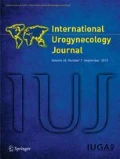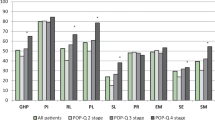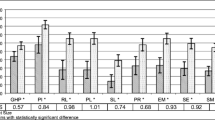Abstract
Introduction and hypothesis
The aim of this study was to translate and validate a Brazilian version of the “Prolapse Quality of Life Questionnaire” (P-QOL) an instrument to assess quality of life of women with genital prolapse.
Methods
Sixty-five patients answered the P-QOL twice. The reliability was assessed using Cronbach’s alpha coefficient and validity was assessed comparing symptom scores between affected and asymptomatic women and comparing symptom scores with prolapse stages. Responsiveness was obtained with patients who underwent to genital prolapse surgical corrections.
Results
The results have showed that the Brazilian Portuguese version of P-QOL has had very good psychometric properties. All items achieved a Cronbach’s alpha greater than 0.70. The test–retest reliability confirmed that the questionnaire was able to detect changes in quality-of-life after treatment.
Conclusions
We concluded that the Portuguese version of the P-QOL is a very good instrument to assess quality-of-life in women with genital Prolapse.
Similar content being viewed by others
References
Swift S, Woodman P, O’Boyle A et al (2005) Pelvic Organ Support Study (POSST): the distribution, clinical definition, and epidemiologic condition of pelvic organ support defects. Am J Obstet Gynecol 192(3):795–806
Hendrix SL, Clark A, Nygaard I, Aragaki A, Barnabei V, McTiernan A (2002) Pelvic organ prolapse in the Women´s Health Initiative: gravity and gravidity. Am J Obstet Gynecol 6(6):1160–1166
Digesu GA, Santamato S, Khullar V et al (2003) Validation of an Italian version of the prolapse quality of life questionnaire. Eur J Obstet Gynecol Reprod Biol 106(2):184–192
Ghetti C, Gregory WT, Edwards SR, Otto LN, Clark AL (2005) Pelvic organ descent and symptoms of pelvic floor disorders. Am J Obstet Gynecol 193(1):53–57
Boyles SH, Weber AM, Meyn L (2003) Procedures for urinary incontinence in the United States, 1979–1997. Am J Obstet Gynecol 189(1):70–75
Digesu GA, Khullar V, Cardozo L, Robinson D, Salvatore S (2005) P-QOL: a validated questionnaire to assess the symptoms and quality of life of women with urogenital prolapse. Int Urogynecol J Pelvic Floor Dysfunct 16(3):176–181
Jackson S, Donovan J, Brookes S, Eckford S, Abrams P (1996) The Bristol female lower urinary tract symptoms questionnaire: development and psychometric testing. Br J Urol 77:805–812
Kelleher CJ, Cardozo LD, Khullar V, Salvatore S (1997) A new questionnaire to assess the quality of life of urinary incontinent women. Br Obstet Gynaecol 104:1374–1379
Guillemin F, Bombardier C, Beaton D (1993) Cross-cultural adaptation of health-related quality of life measures: literature review and proposed guidelines. J Clin Epidemiol 46:1417–1432
Bump RC, Mattiasson A, Bo K, Brubaker LP, DeLancey JO, Klarskov P et al (1996) The standardization of terminology of female pelvic organ prolapse and pelvic floor dysfunction. Am J Obstet Gynecol Jul 175(1):10–17
Nunnally JC (1978) Psychometric theory. McGraw Hill, New York
Carmines E, Zeller R (1979) Reliability and validity assessment: quantitative applications in the social science. Sage, Beverley Hills (CA)
Lowenstein L, FitzGerald MP, Kenton K, Dooley Y, Templehof M, Mueller ER et al (2008) Patient-selected goals: the fourth dimension in assessment of pelvic floor disorders. Int Urogynecol J Pelvic Floor Dysfunct 19(1):81–84
Burrows LJ, Meyn LA, Walters MD, Weber AM (2004) Pelvic symptoms in women with pelvic organ prolapse. Obstet Gynecol 104:982–988
Ellerkmann RM, Cundiff GW, Melick CF, Nihira MA, Leffler K, Bent AE (2001) Correlation of symptoms with location and severity of pelvic organ prolapse. Am J Obstet Gynecol 185:1332–1337, discussion 1337–1338
Mouritsen L, Larsen JP (2003) Symptoms, bother and POPQ in women referred with pelvic organ prolapse. Int Urogynecol J Pelvic Floor Dysfunct 14:122–127
Heit M, Rosenquist C, Culligan P, Graham C, Murphy M, Shott S (2003) Predicting treatment choice for patients with pelvic organ prolapse. Obstet Gynecol 101:1279–1284
Souza CCC, Rodrigues AM, Ferreira CE, Fonseca ESMF, Di Bella ZIKJ, Girão MJBC et al (2009) Portuguese validation of the Urinary Incontinence-Specific Quality-of-Life Instrument:I-QOL. Int Urogynecol J 20(10):1183–1189
Svihrova V, Digesu A, Svihra J, Hudeckova H, Kliment J, Swift S (2010) Validation of the Slovakian version of the P-QOL questionnaire. Int Urogynecol J 21:53–61
Claerhout F, Moons P, Ghesquiere S, Verguts J, De Ridder D, Deprest J (2010) Validity, reliability and responsiveness of a Dutch version of the prolapse quality-of-life (P-Qol) questionnaire. J Pelvic Floor Dysfunct 21(5):569–578
Acknowledgments
We would like to thank Ana Paula Peixoto Scavacini for the English work review.
Conflict of Interest
None.
Author information
Authors and Affiliations
Corresponding author
Rights and permissions
About this article
Cite this article
Scarlato, A., Souza, C.C.C., Fonseca, E.S.M. et al. Validation, reliability, and responsiveness of Prolapse Quality of Life Questionnaire (P-QOL) in a Brazilian population. Int Urogynecol J 22, 751–755 (2011). https://doi.org/10.1007/s00192-010-1354-3
Received:
Accepted:
Published:
Issue Date:
DOI: https://doi.org/10.1007/s00192-010-1354-3




